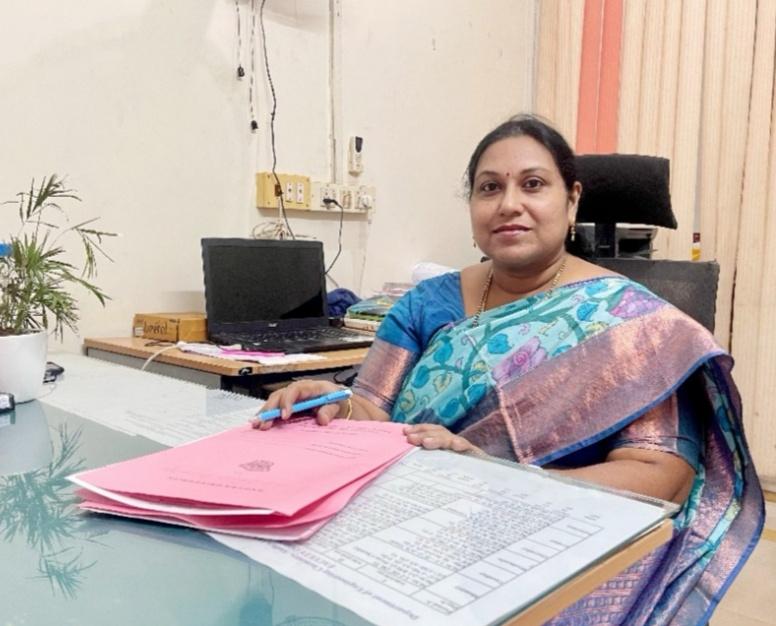
- Name : Prof.G. Hima Bindu
- Designation : Head of the Department
- Phone: 0891 2844912, 4911
- Email: head.enggchemistry@andhrauniversity.edu.in
PROFILE
The Chemistry faculty in the AU College of Engineering was started as Chemistry Section during the year 1963 to cater the needs of all Engineering Branches in matters relating to Chemistry at the first year level. Subsequently, it was elevated to the status of the Department during 1979. In addition to the teaching at the under graduate level, a two year M.Sc. Applied Chemistry Program was started in the academic year 1986. This Program has been found to have great relevance to the rapid industrialization and urbanization of visakhapatnam city. The department has also been offering Ph.D. program in the Chemistry since the year 1975 and so far about 200 Ph.D. degrees and 50 M.Phil. degrees were awarded to the candidates. All the staff members in the department have been actively engaged in the research programmes and published about 200 research papers in various National and International Journals. So far, about four major research projects and a good number of minor research projects have been successfully undertaken by the staff members. The Department has also been undertaking various consultancy works like analysis of cement mortor samples, water samples, complex materials like steel, brass etc. The successful students of the course have been found excellent employment opportunities in india and abroad in various academic and industrial organizations.
NAAC Presentation
Programs
| S.No |
|---|
| Ph.D. in Chemistry |
| M.Sc. Applied Chemistry |
PROGRAM EDUCATIONAL OUTCOMES (PEOs)
- PEO 1: The proficiency in the principles of basic and engineering sciences along with planning, analysis, design and execution of the chemical knowledge.
- PEO 2: An ability to apply knowledge in chemistry for assessing the needs of the society for sustainable development and establishing positive chemical industry practices.
- PEO 3: An attitude towards disseminating the knowledge acquired, continued learning, professional development and team spirit and promoting awareness of environmental concerns.
- PEO 4: The professional ethics and social responsibilities through participatory approach Programme Outcomes (POs) after completion of the master's degree, the graduate will acquire the abilities in the execution of chemical industry projects.
PROGRAM OUTCOMES (POs)
- PO 1: Engineering Knowledge: Apply the knowledge of basic sciences and engineering fundamentals to solve engineering problems.
- PO 2: Problem Analysis: Analyze the complex engineering problems and give solutions related to chemical & allied industries.
- PO 3: Design/ development of solutions: Identify the chemical industrial problems, design and formulate solutions to solve both industrial & social related problems.
- PO 4: Conduct investigations of complex problems: Design & conduct experiments, analyze and interpret the resulting data to solve Chemical Industrial problems.
- PO 5: Modern tool usage: Apply appropriate techniques, resources and modern engineering & IT tools for the design, modelling, simulation and analysis studies.
- PO 6: The engineer and society: Assess societal, health, safety, legal and cultural issues and their consequent responsibilities relevant to professional engineering practice.
- PO 7: Environment and sustainability: Understand the relationship between society, environment and work towards sustainable development.
- PO 8: Ethics: Understand their professional and ethical responsibility and enhance their commitment towards best chemical analysis practices.
- PO 9: Individual and team work: Function effectively as a member or a leader in diverse teams, and be competent to carry out multidisciplinary tasks.
- PO 10: Communication: Communicate effectively in both verbal & non-verbal and able to comprehend & write effective reports.
- PO 11: Project management and finance: Understand the science, engineering and management principles to manage the multidisciplinary projects in whatsoever position they are employed.
- PO 12: Life-long learning: Recognize the need of self-education and life-long learning process in order to keep abreast with the on-going developments in the field of chemical and pharmaceutical industries.
PROGRAM SPECIFIC OUTCOMES (PSOs)
- PS O1: Have strong foundation in the fundamentals and applications of chemical knowledge and understanding
- PS O2: Have the abilities to think critically, logically and analytically and solve problem in the area of chemical sciences, materials, environmental aspects, medicines and energy
- PS O3: Have the abilities to carry out chemical experiments, record and analyze the results and design advanced models
- PS O4: Have the abilities to use modern library and information retrieving tools to obtain information and assimilate to generate concepts and apply them in challenging situations
- PS O5: Have the abilities to effectively communicate their knowledge and skills to other chemists and non-chemists in oral or written formats
- PS O6: Secure suitable employment in the areas of chemical industries like pharmaceutical, steel and metals, polymers, fuels and nuclear, environmental and pollution control, nanotechnology and composite materials, teaching and research, etc.
- PS O7: Have the personal attributes and ethical sensibilities to enable them to function as effective scientists and citizens